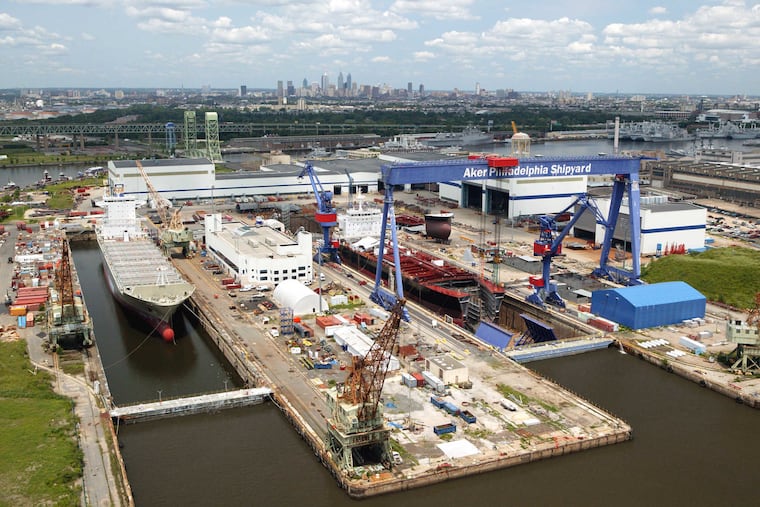Buying American can help keep the Philly shipyard afloat | Opinion
We hope the Trump Administration's strong support for policies like Buy American and the Jones Act will help the Philly shipyard find a sustainable future, despite any short term challenges.

On Saturday, the largest container ship ever built in the United States will be christened. At 850 feet long, it is a testament to the capabilities of Philadelphia Shipyard, where it was constructed, and a fitting tribute to Daniel K. Inouye, for whom the ship will be named. Inouye's story is a classic variation on the American Dream. Born to Japanese immigrants at the height of anti-Japanese sentiment in America, Inouye received the Medal of Honor in World War II and earned a seat in the United States Senate, where for 50 years he championed the American maritime industry, earning himself admirers across the partisan divide.
Another important and quintessentially American story contextualizes today's christening – that of the United States commercial shipbuilding industry's rebirth. In an era when most commercial ships are built in subsidized foreign yards and operated by low-wage foreign mariners, the Inouye defies the international norm. It was built by more than 600 members of the AFL-CIO Metal Trades Department in Pennsylvania.
President Trump avows two simple rules: "buy American" and "hire American." The Inouye is the product of the two buy American, hire American laws in the maritime domain: the Jones Act and cargo preference.
The Jones Act, formally the Merchant Marine Act of 1920, requires that any vessel transporting merchandise between two points in the United States be built, owned, and crewed by American citizens. In the Inouye's capacity as a Jones Act vessel, its "Aloha Class" massive size will be utilized on long-haul routes between the continental United States and Hawaii.
Featuring environmentally friendly technologies and new engineering innovations, the Inouye, along with her sister ship scheduled for completion in 2019, will have some of the lowest operating costs of any United States merchant ships. Even so, without the Jones Act, high-quality, relatively low-cost, environmentally conscious ships such as the Inouye would be priced out – and wiped out – of the domestic market by cheaper, often heavily subsidized, foreign vessels.
Lending further support to the financial viability of the Inouye, cargo preference statutes require that 50 percent of all cargoes procured with United States taxpayer dollars by civilian government agencies be transported on United States-flagged ships. For U.S. military cargo, the requirement reaches 100 percent. Under the cargo preference requirements, the Inouye will perform critical work for the Department of Defense, transporting equipment and supplies between the mainland and United States installations in the Pacific.
>> READ MORE: With dearth of orders, Philly Shipyard's future is at risk
President Trump's commitment to a 355-ship United States Navy, together with this administration's ongoing efforts to expand opportunities for United States industry, are creating the conditions for a more vibrant maritime industry and the rejuvenation of great maritime cities such as Philadelphia. This is great news for the men and women who work as skilled craftsmen across the country.
The average annual wage of a worker in shipbuilding is almost $70,000, well above the national average of $55,375. Although these jobs have clear value, many have been eliminated in recent decades, declining from a high of 180,000 in 1980 to 94,004 today. President Trump is committed to the restoration of these jobs through the revitalization of American shipbuilding. Even better, the mariners who operate the ships built because of the Trump administration's support for buy American, hire American policies stand to earn an annual salary of more than $101,000.
As important as these economic benefits are, the national security benefits are even larger. Going back to the days of George Washington, American leaders have understood that without a civilian shipbuilding capability and a vibrant United States-flagged merchant marine, the United States would be unable to build and maintain a navy.
The merchant marine helps to provide our military the mobility it requires, in both troops and equipment, to confront threats around the world. The Inouye and its sister ship will materially help add to the pool of highly trained merchant seamen. The same shipbuilding industrial base that constructs ships such as the Inouye is therefore essential to the maintenance and resilience of a robust United States Navy.
The Jones Act and cargo preference were designed to meet these national security objectives, and the Trump administration is committed to improving both so that we once again have a robust United States flag fleet and shipbuilding industry.
In the interests of both economic prosperity and national security, we therefore hope that the Trump administration's strong support for policies such as Buy American and the Jones Act will help the Philly shipyard find a sustainable future, despite any short-term challenges.
In the meantime, Saturday will be a fine day to celebrate the entrepreneurship, ingenuity, and hard work of the American men and women who have made the christening of the Inouye possible.
Peter Navarro is assistant to the president and director of the White House Office of Trade & Manufacturing Policy.